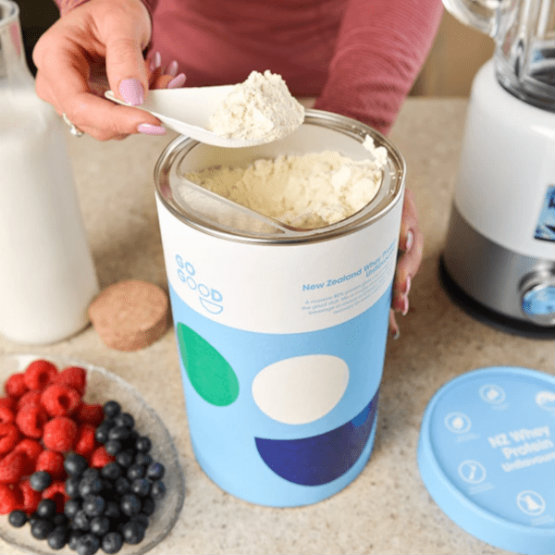
Whey Protein 101: Types and Benefits
Sure, regular working out helps you build muscles and look fit, but to insure success, it’s also important to fuel your muscles with supplementation and a proper workout meal plan. And when it comes to workout meal plans, they are obviously dominated by protein. However, the protein found in foods is often not enough, which is why many choose to use protein supplements.
For anyone who is exercising, it’s beneficial to supplement the normal intake of protein with energy bars and shakes. If you are a beginner at this, and still getting familiar with supplementation, here’s what you should know about one of the best supplement with high protein levels – whey protein.

What Exactly Is Whey Protein?
This protein is a mixture of proteins that are separated from the whey (whey being the liquid part of milk that isolated during the cheese-making process). In fact, milk contains two types of protein: whey and casein. When cheese or other dairy products are produced, the fatty parts of the milk coagulate and the whey are separated as byproducts. After being separated, whey goes through certain processing steps in order to become what is these days generally known as whey protein. After being separated, it is powdered and as such can be conveniently added to shakes and protein bars. Since it doesn’t taste very good on its own, whey protein is usually flavoured (chocolate, strawberry, and vanilla are the most popular flavoured-powders).
What Are the Three Types of Whey Protein?
Whey Protein Isolate
Whey protein isolate, or also known as WPI or Iso whey, is the purest form of all three types of whey proteins. The initial whey protein has been filtered to such a high degree that any concentrated impurities have been completely removed. This type of protein is so pure, that it’s approximately 90-95% protein(for example, 25g protein per 30g scoop).

Aside from this, protein whey isolate is also low in fat, carbohydrates, sugar, lactose and gluten. This makes it the ideal dietary supplement for strength and muscle building. A single serving of whey isolate may provide your body with all of the amino acids that it needs to promote great health results from the workout and fitness efforts. These amino acids also assist in the rapid repair of damaged muscle tissue post-workout. Plus, this makes it ideal for those looking to maintain a lean physique or those who want to lose weight.
In addition, WPI may be a safe option for those who want to avoid lactose, or are completely lactose intolerant, or suffer from bloating or gastric issues, since the micro-filtration process of this protein reduces lactose heavily. Another great benefit of supplementing with this protein is the extremely rapid absorption into the bloodstream. Being pre-digested and already being in small peptides makes it easily absorbing, requiring minimal breakdown and processing. Following this, you may want to get protein whey isolate as the perfect post-workout supplement.
Whey Protein Concentrate
This protein is approximately 80% protein, and is usually cheaper than whey isolate. In addition, this is also the most popular beginner protein supplement. Whey protein concentrate is also known for its ability to be quickly absorbed by the body. Plus, this is a good option for those consumers who do not mind that it comes with more calories, fat, and carbohydrates per serving than the other whey protein types. In other words, it’s a great choice if you want to gain more weight in the form of muscles.
Whey Protein Hydrolysate
The protein in hydrolyzed whey protein is whey protein isolate or concentrate that has been broken down into smaller pieces. This makes absorption of proteins and amino acids much easier. It is great for those looking for high-quality protein source capable of helping to meet total daily protein goals and maximizing muscle growth while reducing fat. It also helps in exercise recovery, increasing thermogenesis, improving fat loss, and reducing hunger. However, the protein hydrolysate generally costs significantly more than normal whey protein, and the greater the degree of hydrolysate is, the greater the cost will be.

Benefits of Whey Protein
Aside from being an excellent source of high-quality protein, promoting muscle growth, helping in weight-loss, and reducing hunger and cravings, whey protein also has some additional benefits that may surprise you.
Immunity-Boosting
Aside from providing excellent nutrition to your entire body, using whey protein has some added benefits for your gut health as well. The majority of our immune response comes from the gut, and when the bacterial biome is healthy – our entire body is healthy. It’s been proven that high doses of whey protein supplements significantly reduce the C-reactive protein, which is a key marker of inflammation in the body.
May Help Treat Type 2 Diabetes
This type of diabetes is a chronic disease characterised by high blood sugar. What is supposed to stimulate the uptake of blood sugar into cells, keeping it within healthy limits, is the insulin hormone. And it has been found that whey protein increases the levels of insulin and the sensitivity to its effects.
May Lower Blood Pressure
Numerous studies have shown that whey protein significantly reduced blood pressure in patients with hypertension. Since high blood pressure is one of the leading risk factors for heart diseases, whey protein also reduces the risk of developing heart disease or stroke.


